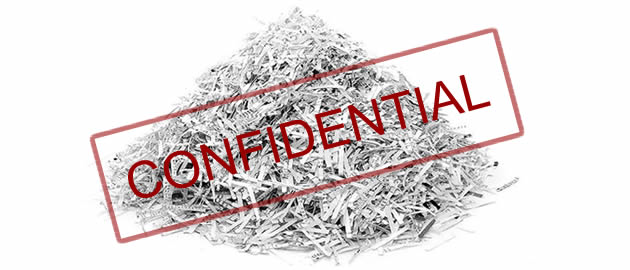As a company specialising in confidential shredding services, we are often asked why businesses need to bother using a shredding service. After all, doesn’t using your office shredder do the job? The truth is, while using your office shredder (provided it’s cross cut) might be fine if you only handle 1 or 2 confidential documents a month, if you deal with confidential or sensitive information every day it becomes an endless task. So today we wanted to share with you what classifies as ‘confidential information’, and why it’s important you dispose of it correctly.
What Counts As A Confidential Record?
A confidential record is any document that contains or may contain sensitive information about an individual or business. For example, a client file may contain their name, address, credit card details, national insurance numbers or insurance information. All of these details are confidential, and could cause a lot of disruption if they fell into the wrong hands. Identity theft and fraud isn’t just something individuals have to worry about – the same goes for businesses as well. So if you have an invoicing receipt containing your customer’s bank details, address and services bought, it needs to be destroyed securely. If you aren’t sure if a record is confidential or not, just think ‘what could a criminal do with this information?’ If anything at all comes to mind, then it is best to follow confidential document destruction policy.
How Can You Destroy Confidential Records Securely?
Secure shredding can be done on or off site, allowing you to witness your documents being destroyed. Once you have stored your confidential information, you can deliver them to your secure shredding partner, or they can bring the machinery to you. Using powerful industrial machinery your documents are fed through several sets of shredders, each rendering your documents into finer and finer shreds. Eventually your documents will be reduced to illegible shreds of paper and mixed with other lots of destroyed documents, making it impossible to piece them back together. This method of document destruction is simple and effective, and completely eliminates the risk of ID theft, fraud, data loss or confidentiality breach. The high tech equipment used by shredding companies can also handle CD’s, DVD’s, fabric, hard drives, X-Rays and much, much more, so you know that no matter what form your data takes, it can destroyed effectively.
Why is It Important To Invest In Confidential Shredding?
Besides bringing you peace of mind, the first and most important reason to invest in a secure shredding solution is the legal requirement to ensure that your business disposes of sensitive information in a secure fashion. The Data Protection Act states that every business has a legal obligation to protect the confidential information it holds on employees, customers and suppliers, and this includes its storage and destruction. Failure to ensure such information is protected can result in heavy fines for both the individual responsible and the business, as well as the potential imprisonment of the person responsible. The seventh principle of the DPA states that organisations must employ a data destruction service to destroy redundant confidential information that is stored in either paper or electronic formats. Now as we said before you could adhere to this by sitting an employee over your office shredder, but this might land you in hot water should something go wrong, because there is no proof that the documents were destroyed. With a secure shredding service, you will always be issued a certificate of destruction, which acts as legal proof that your confidential documents have been destroyed and disposed of securely.
If you’re document destruction procedures aren’t up to scratch you may be opening yourself up to a lot of liability. So while sitting over the office shredder might seem like a great way of saving money, in the end the risks are just not worth it. Instead, employ a secure shredding company to help you with your compliance, and eliminate the risk to your business of fraud, theft and criminal prosecution. Not sure where you stand? Get in touch for a free consultation today.


Recent Comments